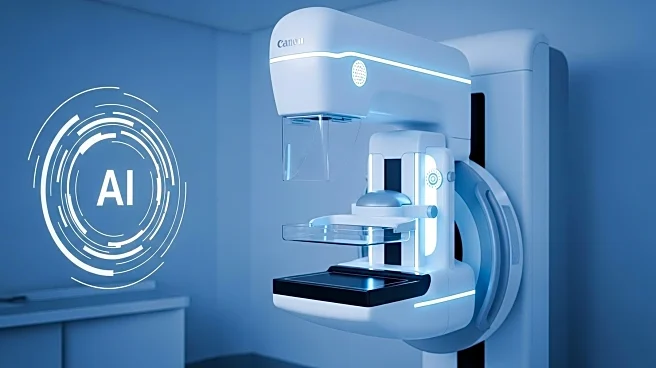What is the story about?
What's Happening?
Hologic's AI-powered mammography technology is being highlighted at the European Society of Breast Imaging (EUSOBI) Annual Scientific Meeting. Two studies have demonstrated the technology's potential in identifying aggressive breast cancers and performing comparably to radiologists in cancer screening. The first study, conducted at Massachusetts General Hospital, analyzed 600 exams using Hologic's Genius AI Detection 2.0 solution, finding that AI case scores were higher for more aggressive tumors. The second study compared the AI system's performance with 108 radiologists from the UK and U.S., showing similar cancer detection capabilities with higher sensitivity but lower specificity. These findings suggest AI could be a valuable tool in addressing radiologist shortages and improving early cancer diagnosis.
Why It's Important?
The integration of AI in mammography screening represents a significant advancement in healthcare technology, potentially improving early detection rates of breast cancer. This is crucial as early diagnosis can lead to better treatment outcomes, particularly for aggressive cancer types. The technology's ability to perform comparably to radiologists could alleviate workforce shortages in countries where mammograms are typically reviewed by multiple radiologists. This could streamline the screening process, reduce diagnostic delays, and enhance patient care. The broader adoption of AI in medical imaging could also drive innovation in other areas of healthcare, improving efficiency and accuracy in diagnostics.
What's Next?
Hologic plans to continue advancing its AI technology and showcase its latest breast surgery innovations at EUSOBI, including the Sentimag Gen 3 device for tumor localization. The ongoing studies will further evaluate the AI system's performance and its potential role in clinical settings. As AI technology continues to evolve, it may become a standard tool in radiology, prompting healthcare providers to integrate AI solutions into their diagnostic processes. This could lead to changes in medical training and protocols, as well as discussions on ethical considerations regarding AI's role in healthcare.
Beyond the Headlines
The use of AI in healthcare raises important ethical and legal questions, particularly concerning data privacy and the potential for AI to replace human jobs. As AI systems become more prevalent, there will be a need for regulations to ensure patient data is protected and that AI complements rather than replaces human expertise. Additionally, the technology's impact on healthcare costs and accessibility will be closely monitored, as it could either reduce costs through efficiency or increase them due to the need for new infrastructure and training.
















